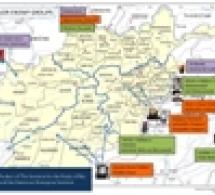 |
 |
Critical Moments in Iraq
Various politicians in Iraq are attempting to alter the results of the parliamentary elections either through manual ballot recounts or by disqualifying candidates after voters have already been cast. The manual recount of votes commenced on Monday in Baghdad. The Accountability and Justice Commission (AJC), at the urging of Prime Minister Maliki, had 52 candidates “retroactively disqualified” claiming they had ties to Saddam’s Baath party.
-Kandahar's political and economic life is dominated by several commercial and military networks. Ahmed Wali Karzai is at the center of a number of these networks, and has considerable influence over business life in Kandahar City itself, with significant private security, real estate, and contracting interests.
-Ahmed Wali Karzai has used his informal power and his connections to the Afghan state to give him shadow ownership of the government of Kandahar.
-Anti-government sentiments are exploited and aggravated by the Taliban. Many of the local powerbrokers who are excluded from Wali Karzai’s network see the Taliban insurgency as the only viable means of political opposition.
